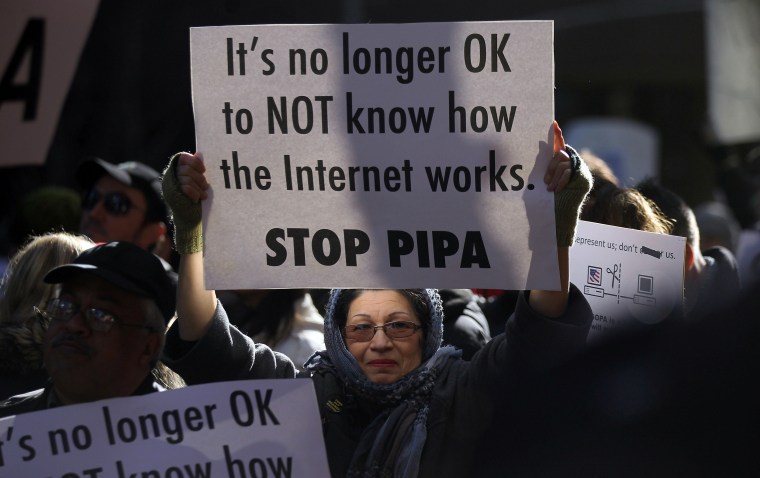Two years after the anti-piracy bill SOPA sparked protests from activists concerned about Internet freedom, issues around what can be done to limit activity online continue to rage on.
The Stop Online Piracy Act of 2011 effectively pitted Hollywood against Silicon Valley -- copyright holders against Internet companies -- as lawmakers trained their eye on overseas websites like The Pirate Bay. The broad language of the bill, which aimed to stop copyright infringement by restricting access to sites that allow the spread of pirated content, had some afraid that third-parties like search engines and payment processors would get caught up in the dragnet.
Websites went dark, demonstrators marched, and activists gave speeches, and on Jan. 20, 2012, SOPA was defeated. SOPA had become a lightning rod for all sorts of issues surrounding the shift that the Internet created: copyright law, Internet freedom and the language used to govern computer crimes.
That was all two years ago. What’s the fight over now?
“SOPA left a lasting legacy,” said Parker Higgins, spokesman at the digital-rights advocacy group Electronic Frontier Foundation. “If you look at these Internet-related issues at their base as free-speech concerns, the battle SOPA started is still continuing.”
No current legislation or public debate is a perfect mirror to SOPA, but the concerns that the now-dead bill left unresolved are still boiling – and more have popped up in the interim. A number of related issues are working their way through either U.S. courts or the court of public opinion.
SOPA stirred up several passionate debates, but copyright law lay at the heart of the bill. Both sides seem to recognize that piracy is a problem, and that protecting content is important.
“Most people agree that the system isn’t serving people well on either side – whether you’re the person sending a letter about copyright infringement, or if you’re receiving it,” said Sandra Aistars, executive director of the Copyright Alliance, which represents 13,000 artists and 40 institutional members. For small artists in particular, she added, “the cost of litigation isn’t worth the amount of royalties they would receive.”
Full copyright law reform is likely far off, but the topic is being discussed on Capitol Hill. The House Judiciary Committee held several copyright-focused hearings in 2013, and the U.S. Copyright Office submitted a report in September that recommended creating a copyright-complaint “tribunal” similar to small-claims court.
Another contentious debate revolves around net neutrality. Companies like AT&T, Verizon, Sprint and T-Mobile won a battle in the fight over "net neutrality" just this week, when a U.S. appeals court overturned rules that banned carriers from giving special treatment to Internet traffic from certain sources. The ruling opens the door for carriers to sell faster connections to customers who pay more.
The ruling is expected to be appealed.
“Net neutrality will be a huge piece of any debate over the future of the Internet,” said Mike McGeary, co-founder of Engine, which works with startups and lawmakers to help shape public policy.
Then there’s Edward Snowden. Higgins pointed to last summer’s uproar over the National Security Agency’s surveillance program as “a perfect example of quickly mobilized opposition that would have been unprecedented before SOPA.”
This week President Obama ordered the NSA to reform its intelligence-gathering practices, in part by no longer storing vast amounts of phone data and other records.
The biggest legacy of SOPA’s defeat, however, may be the groups of dedicated activists it drew out of the woodwork.
“What resonated after SOPA was the activism,” said Higgins of the EFF. “People realize now how much the Internet affects their lives, and they won’t let you mess with it.”
In Congress, at least, the discussion is reportedly more active than ever.
“At the peak of the SOPA debate, you heard [members of Congress] say one after another: ‘I’m not a tech guy!’” Higgins said. “At the time, it was folksy. An asset. Now it’s a liability.”
McGeary, of the Engine public policy firm, agreed.
“It’s no longer acceptable not to have at least a cursory understanding of what you’re expecting to legislate,” he said.
Engine’s training sessions aimed at educating lawmakers are “much better attended” compared with the SOPA era of two years ago, he added.
“There’s been more willingness on both sides to take up some of these issues,” McGeary said. “They may not always come to the same conclusion. But at least everyone realizes that understanding the issue at hand is an important distinction.”
Julianne Pepitone is a senior technology writer for NBC News Digital. Previously she was a staff writer at CNNMoney, where she covered large tech companies including Apple and Google, as well as the intersection of tech and media. Follow Julianne on Twitter at @julpepitone or email her at julianne.pepitone@nbcuni.com.
